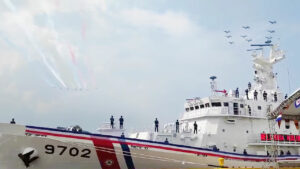Duterte sends off patrol ship to South China Sea

PRESIDENT Rodrigo R. Duterte on Sunday led the commissioning of a Coast Guard ship that is set to patrol Philippine-claimed territories in the South China Sea, years after foreign policy experts started criticizing him for his government’s lack of presence in the waterway.
Mr. Duterte, 77, rendered a salute to acknowledge the vessel as he formally allowed its commanding officer to start its official duty, the Philippine Coast Guard said in a Facebook post.
The agency said the ship would roam around the country’s maritime jurisdictions, including the South China Sea in the west and Philippine Rise eastward.
The vessel, named after Filipina revolutionary Melchora Aquino, is one of the two largest white ships acquired by the Transportation department for the coast guard.
It is modeled after the Japan Coast Guard’s Kunigami-class vessel that has a maximum speed of 24 nautical miles per hour and endurance of not less than 4,000 nautical miles, according to the coast guard.
Earlier in the day, Mr. Duterte and other Philippine officials participated in a ceremony to commemorate the country’s 124th Independence Day.
Defense Secretary Delfin N. Lorenzana, who joined the event, fainted and an ambulance brought him to a nearby hospital where he has since stabilized, the Defense department said in a separate statement.
The Defense chief, 73, fainted due to fatigue after his engagements outside the country, including a recent dialogue in Singapore with his foreign counterparts, the agency said. Extreme temperatures in the Philippine capital might have also led to his fatigue, it added.
Mr. Lorenzana last year said China had tried to stop a key defense treaty between the Philippines and the US.
Filipino experts have said a total foreign policy shift from the US to China is unlikely because the Philippine Defense establishment is staunchly pro-American.
Mr. Duterte led a foreign policy pivot to China when he took office in 2016 in exchange for investment pledges, most of which did not materialize.
The Philippines is a longtime ally of the US and both are committed to a bilateral defense treaty, Mr. Lorenzana had said when China accused Washington of sowing chaos in Southeast Asia.
Filipino activists and patriots have been calling on the Philippine government to pursue an independent foreign policy and scrap the country’s Mutual Defense Treaty with the US, which they said has violated the country’s sovereignty and led to human rights violations.
“Our country is not truly free,” progressive group Bagong Alyansang Makabayan (Bayan) said in a statement. “We are not free from foreign interventions involving the US and China, which are both in a race to control the South China Sea.”
In 2020, Mr. Duterte threatened to terminate a visiting forces agreement with America after the latter Embassy canceled the visa of Senator Ronald O. Dela Rosa, his former police chief who led his deadly war on drugs.
Activists said the military pact, which lays down the rules for the deployment of troops for war games, has favored the US.
“While we draw strength from learning our past, we must continue believing that there is still wisdom to be gained from our present choices, decisions and actions so we can shape a better future for our people,” Mr. Duterte said in his Independence Day speech.
Vice President Maria Leonor G. Robredo, who has been calling for a coalition of nations against China’s militarization and island-building activities in the South China Sea, urged Filipinos in a recorded video to “affirm what is right and true and assert the truths of our history.”
Ms. Robredo, whose six-year term ends this month, lost to Ferdinand R. Marcos, Jr. in the May 9 presidential race.
Critics have said Mr. Marcos is likely to pursue closer trade and investment ties with China. Last week, he called China the Philippines’ “strongest partner.”
Also on Sunday, civic groups and human rights advocates gathered at a national monument built to honor the victims of the Martial Law regime of Mr. Marcos’ late father.
They cited threats to freedom and scored the rise of disinformation, which academics consider as an emerging threat to democracy.
Political analysts have said civic groups and the international community would closely watch the moves of Mr. Marcos, who is widely seen as a continuity president, after he stayed mum on key issues during the campaign. — Kyle Aristophere T. Atienza




